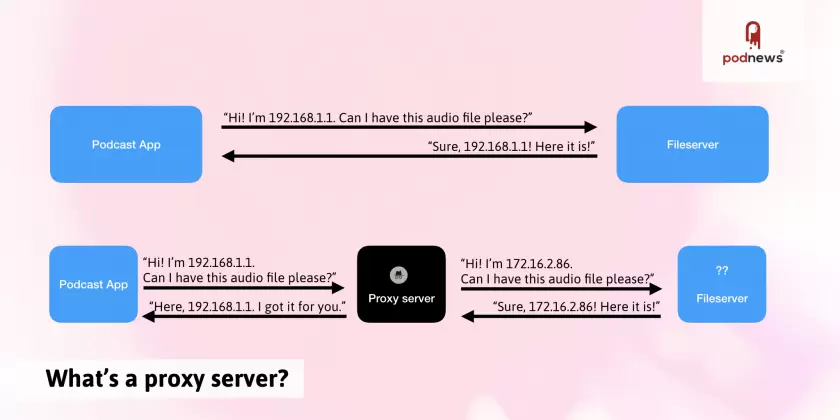
What's a proxy server? And why was Luminary using one?

This article is at least a year old
Normally, when you ask an internet server for a file, your computer connects directly to that internet server. That means that your IP address - the unique number that your internet connection has - is part of the request; and therefore the internet server knows your IP address, and therefore your rough location. For podcasts, it means that your host can accurately work out how many listeners you have; and also can dynamically insert advertising that is relevant to your location. (No ads for the US Postal Service for listeners in Europe, for example. This is a good thing. No European wants your stamps, US Postal Service).
A proxy server is a computer in the middle. Your computer connects to a proxy server, which then connects to the final internet server where the file is. The podcast host can’t see who asked for the file. This seems like a good idea for privacy; but it’s a bad idea for podcast hosts, since they can’t accurately count different listeners, and nor can they serve any geo-targeted dynamic advertising. The IAB’s rules also instruct them to disregard all of this traffic as invalid. They also don’t know whether the proxy server was also caching the audio (and therefore whether they had significantly more listeners).
Checking our logs, our own podcast on Luminary had been listened-to a number of times by 172.68.86.39, 172.68.86.34 and 108.162.219.149. All three of these IP addresses are proxy servers, owned by Cloudflare, a global caching service.
“To be absolutely clear,” says Luminary in a tweet, “Luminary has never hosted or cached audio for any open RSS feed podcast. We used a pass-through approach purely because we believed it would improve performance and speed for our users when listening to public feed audio files, particularly from smaller hosts.”
For the record, though - “pass-through”, or a non-caching proxy, can’t improve performance. It simply adds another link in the chain. If the “smaller host” is running a slow server, then pass-through will similarly be slow for the end user. There’s no technical benefit to a non-caching proxy.
Proxy servers are helpful to monitor traffic, and many corporates use them in this way. But Luminary has full statistics from their app and website anyway, so they needn’t use proxy servers for monitoring purposes.
Proxy servers are also useful to circumvent censorship or geo-locking; both unlikely to be the reason that Luminary put them in place.
The company has now removed this proxy server. We’ve confirmed the removal, on web, on Android, and it also looks to be removed from iPhone.
 | James Cridland is the Editor of Podnews, a keynote speaker and consultant. He wrote his first podcast RSS feed in January 2005; and also launched the first live radio streaming app for mobile phones in the same year. He's worked in the audio industry since 1989. |















































































